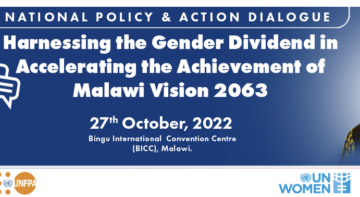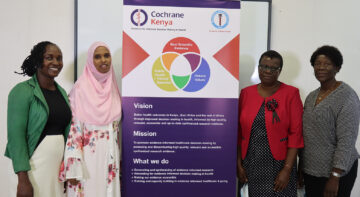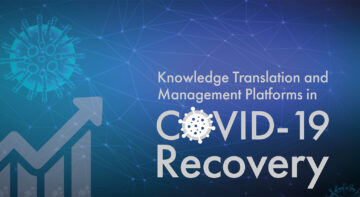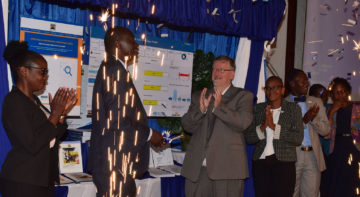News

We have, this week, started responding to the huge demand for our ground-breaking training programme on use of research evidence in decision-making by county governments in Kenya. We are conducting a 5-day training workshop for senior health officials from Kajiado and Nairobi counties in Kenya on finding, interpreting and applying research evidence in decision-making.
Given the value of evidence in enhancing effectiveness of health service delivery, we believe that this training will contribute to the improvement of health service delivery, which is now the main function of county governments in Kenya.
During the workshop’s opening session, county officials have indictaed that the training is very timely and they expect to acquire skills that will enable them to use evidence to tackle the urgent challenges to health service delivery and ultimately improve health outcomes in their counties.
In his opening remarks, the County Executive for Health in Nairobi County, Hon. Dr. Bernard Muia, underscored the importance of health officials to make decisions based on verifiable evidence. “I think it would be very unfortunate if doctors have to resort to opinions of others as they make policies and critical decisions on how to respond to public health challenges that Kenyans face.” He noted that time has come for research evidence to play a guiding role in policy-making, something that is already a reality in most developed countries. He therefore lauded AFIDEP’s support in this regard.
The County Executive for Health in Kajiado County, Hon. Gladys Marima, in her opening remarks, agreed with her Nairobi Counterpart. She told participants that Kajiado County has ensured that the health sector is the most well-funded, highlighting its importance in laying the foundation for the success of all other sectors. Health has been allocated Kshs. 1.4 billion in the current financial year. “As a government, we are committed to improving health delivery in Kajiado County, which is very vast and diverse.” She announced that she would participate in the training because she is very keen to build her capacity in application of evidence in policy-making.
Dr. Rose Oronje, AFIDEP’s Director for Science Communications and Evidence Uptake, expressed AFIDEP’s commitment to enabling increased use of evidence in Kenya and Africa at large, and lauded the two counties’ value and commitment to evidence use.
Dr. Charles Nzioka, the Director, Division of Health Research and Development at the Ministry of Health headquarters who was also a facilitator of the training, said the partnership between AFIDEP and his Ministry which started in 2014 is a “God-send”. It came at the time when despite capacity building for health officials in use of research evidence being part of the Ministry’s long term strategy, competing demands for resources had made it difficult to implement the needed capacity building initiatives at the national level.
The EIMP initiative is implemented by AFIDEP under a broader programme known as Strengthening leadership and capacity for evidence-informed decision-making in Africa (SECURE Health). It has two main objectives: optimising institutional leadership and capacity to enhance evidence use; and enhancing individual skills and capacity of policymakers in the health ministry and the legislature in accessing, appraising and using evidence. The broader SECURE Health programme is funded by DFID under its Building Capacity to Use Research Evidence (BCURE) programme.
Related Posts





